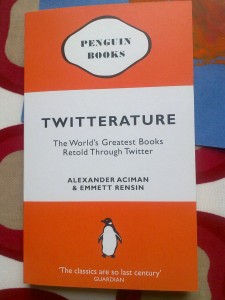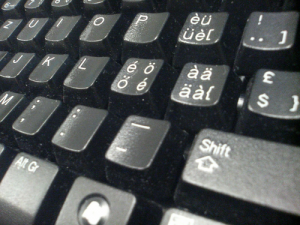Much excitement in the Mansfield household yesterday when this dropped onto the doormat.
Yes, it's the much-anticipated sixth book in the Hitchhiker's Guide series, And Another Thing, this time penned by renowned kids' author Eoin Colfer. It's been years since I read the original H2G2, but this is actually quite exciting. A recent Guardian article about the series charted how Adams rose from being a lowly comedy writer to one of the most revered writers of his generation, as a result of the success of the Hitchhikers' Guide series. I'm looking forward to starting it over the next couple of days to see how Colfer manages to keep the series going – a tough job by anyone's standards.Twitterature is here: Literary classics through tweets
 The World’s Greatest Books Retold Through Twitter, aka Twitterature, hit our doormat earlier this week.
The World’s Greatest Books Retold Through Twitter, aka Twitterature, hit our doormat earlier this week.
A clever, yet bizarre little tome in which some of the most revered pieces of literature are cut up into 140-character chunks and spewed out at speed.
Thus, if you’ve never read, say Dante’s Inferno, you ‘may’ be able to work out what the plot is through tweets like this…
‘I’m being attacked by three theoretical beasts! I don’t think I’m in Italy any more!’
Other greats retold include Beowulf, Romeo & Juliet, Crime and Punishment and Metamorphosis
The accent’s on getting it right
 Really enjoyed the Reader’s Editor column in Monday’s Guardian about accents on foreign words.
Really enjoyed the Reader’s Editor column in Monday’s Guardian about accents on foreign words.
As a linguist, writer and sub, this ticks so many boxes – the difficulty, but the importance of making sure that the correct accents are placed on foreign words.
The shout that often comes up, when writers, subs etc miss the odd grave, tilde or umlaut, is, ‘oh, it doesn’t really matter’.
But clearly it does. Missing accents is just plain ignorance. You may roll your eyes at the grave accent in Arsène Wenger, but if you were called Paul Smith and someone spelled your name Paul Smoth, you’d be mightily peeved, wouldn’t you?
Sweeping generalisation, obviously, but it all goes back to the English notion that everyone should speak their language, rather than learn a new one.
If only tilde, umlaut, cedilla and diaresis were everyday words, we’d all be a little bit better informed!
